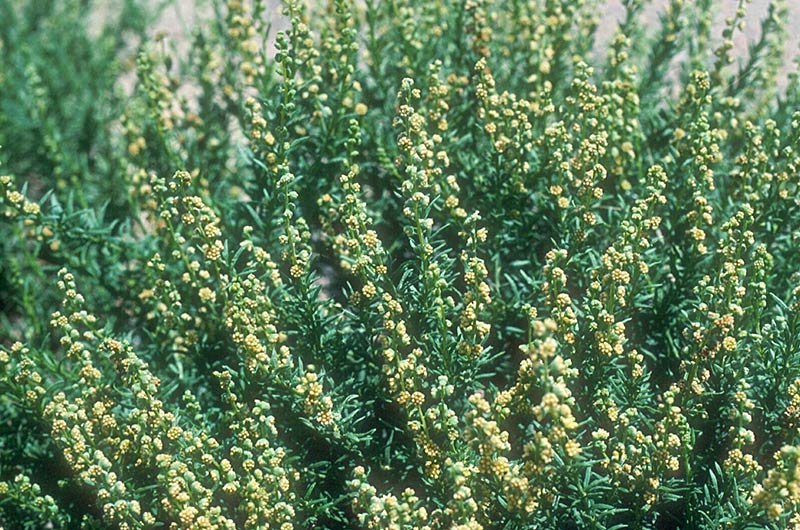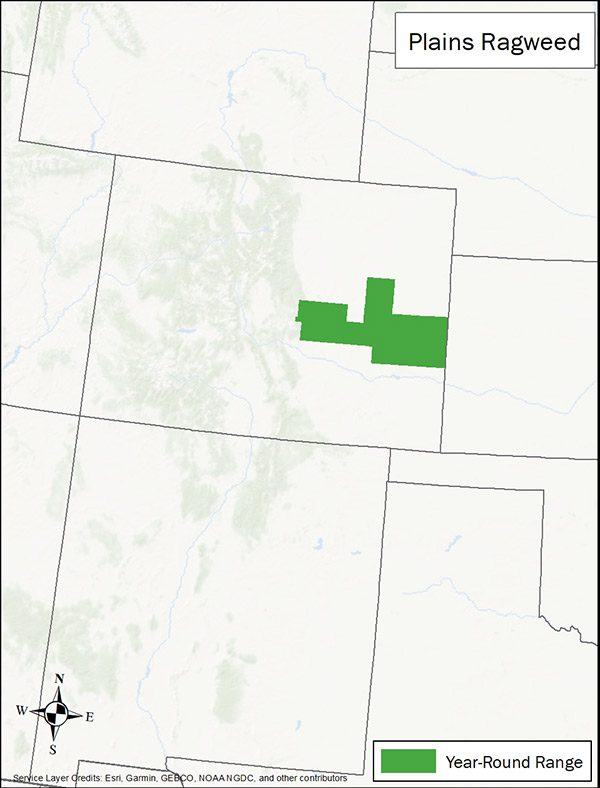LandPKS Learning
Habitat Hub

Plains Ragweed
Plains ragweed is found in moist areas around playas, which are temporary depressional wetlands filled by local rainwater. In years with prevalent spring rainfall, many playas fill with water, and this species is abundant.
Ambrosia linearis
Identification
Plains ragweed, also known as linear-leaf bursage, is restricted to east-central Colorado. This endemic flowering plant is a member of the aster or sunflower family. Plains ragweed grows 8-20 in/20-50 cm in height. The leaves are mostly alternate and linear, smooth on the top and hairy on the underside. Flowers are small, inconspicuous, and white, yellow, or green in color. Male and female flowers are found on the same plant. Male flowers are yellow, cup-shaped with short hairy bracts with 12-20+ florets (small flowers making up a composite flower head). Female flowers are below the male flowers on the stems, inconspicuous, and have a series of spines. Plains ragweed also has a somewhat woody base and a prominent taproot.
Observation Tips
Plains ragweed can be found around the edge of playas, intermittent streams, and along roadside ditches in east-central Colorado. Flowers appear in June through early August. Often found in large, vigorous stands in moist, sandy areas around playas.
Interesting Fact
Plains ragweed is found in moist areas around playas, which are temporary depressional wetlands filled by local rainwater. In years with prevalent spring rainfall, many playas fill with water, and this species is abundant.
Ideal Habitat
Plains ragweed is found at the edge of playas, intermittent ponds, intermittent streams, and dry creek banks. The habitat is typically clay at the bottom of the playa for water holding and sandy around the edges in seasonally moist areas of the shortgrass prairie. The species will also occur along roadsides in ditches.

Range Map provided by US Department of Ag, PLANTS Database
Management Activities that Benefit Species – Best Management Practices (BMPs)
Since many of the plains ragweed populations occur on private land, landowners have an important role to play in the survival of the species. Maintain intact native shortgrass prairie surrounding intermittent streams and playas. Playas ideally will not be altered by digging to make them deeper which impacts the clay water holding soil layer. Where habitat is degraded, restoration actions should be taken. Livestock management through rotational grazing should provide adequate habitat for this rare plant and forage for livestock and wildlife. Weed management should be an integrated approach using mechanical and chemical practices, so that herbicide use does not negatively impact native species.
Management Activities to Avoid
Avoid plowing or other conversion of native prairie and manipulation or excavation of natural playas. Do not put roads near or within playas as that will impact the hydrology of the playa. During road maintenance, do not reseed roadsides with aggressive nonnative species such as smooth brome, which will outcompete plains ragweed and other native species.
Other Species that Benefit from Similar Habitat Management
Management of native playa habitat will benefit other species that rely on playas, including tiger salamanders and migratory waterfowl, and wading birds.
Download
Download the plains ragweed factsheet
Descarga la ficha de plains ragweed
Other Resources
NatureServe. 2021. NatureServe Explorer: An online encyclopedia of life [web application]. Version 7.1. NatureServe, Arlington, Virginia. Linear leaf bursage.
Ackerfield, J. 2015. Flora of Colorado. Brit Press
Spackman, S., B. Jennings, J. Coles, M. Minton, A. Kratz, and C. Spurrier. 1997. Colorado Rare Plant Field Guide. Colorado Natural Heritage Program.
US Department of Agriculture, NRCS. 2020. The PLANTS Database. National Plant Data Team, Greensboro, NC 27401-4901, USA. Ambrosia linearis
Mobile App | Data Portal | Knowledge Hub | Habitat Hub | Learning Collections | Blog | About | Contact | Support



